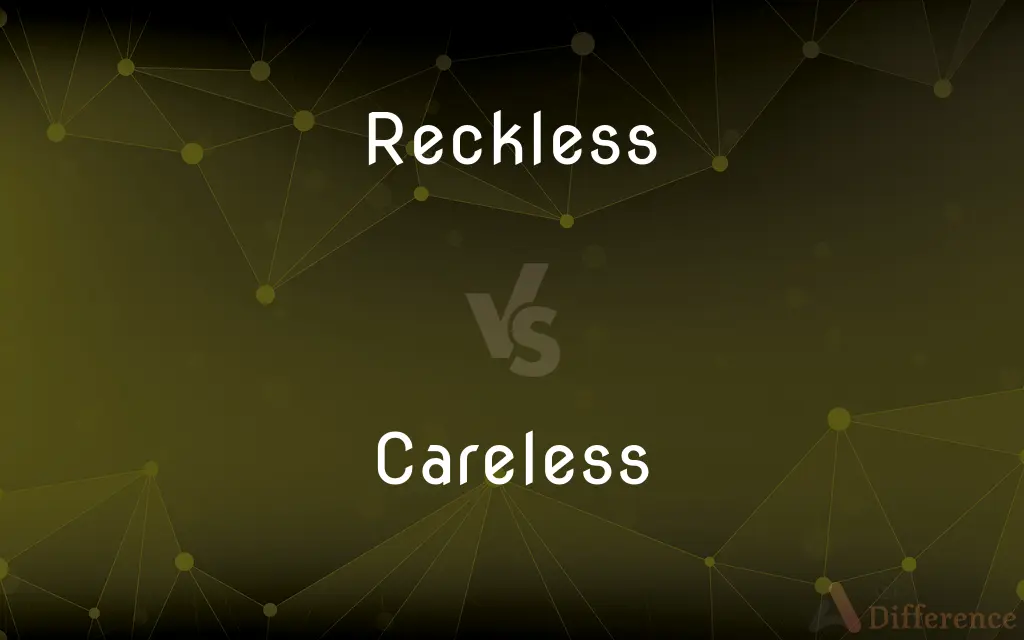Reckless vs. Careless — What's the Difference?
Edited by Tayyaba Rehman — By Maham Liaqat — Updated on April 18, 2024
Reckless implies a conscious disregard for danger or consequences, often involving risk-taking, while careless denotes a lack of attention or negligence without intentional risk.

Difference Between Reckless and Careless
Table of Contents
ADVERTISEMENT
Key Differences
Reckless behavior involves conscious decisions to ignore potential risks and dangers, highlighting a disregard for personal safety and that of others. In contrast, careless actions are characterized by a lack of attention or thoroughness, generally unintentional and stemming from neglect rather than deliberate choice.
When someone acts recklessly, they are aware of the risks involved but choose to proceed anyway, often driven by thrill or defiance. Whereas, someone who is careless may simply be failing to pay sufficient attention to their actions, without any intention of taking risks.
Legal contexts often distinguish between recklessness and carelessness, especially when assessing liability or intent. Recklessness is usually seen as more severe because it involves the conscious choice to ignore known risks. On the other hand, carelessness may lead to lesser charges or penalties because it implies a lack of intent to cause harm.
In everyday language, calling someone reckless often suggests they are prone to taking dangerous risks. Whereas, describing someone as careless implies they might frequently overlook details or make mistakes out of negligence.
Insurance policies, too, may differentiate between these behaviors, potentially covering accidents arising from carelessness but not those resulting from recklessness, which is deemed preventable through responsible behavior.
ADVERTISEMENT
Comparison Chart
Awareness of Risk
Aware and ignores it
Unaware or inadvertently overlooks it
Intent
Often intentional risk-taking
Lack of intention, more accidental
Legal Implications
Generally severe (higher culpability)
Less severe (lower culpability)
Common Descriptions
Thrill-seeking, dangerous
Negligent, forgetful
Insurance Impact
Less likely to be covered
More likely to be covered
Compare with Definitions
Reckless
Marked by a lack of regard for the danger or consequences of one’s actions.
His reckless driving eventually led to a serious accident.
Careless
Failing to pay sufficient attention to avoiding harm or errors.
His careless mistake during the presentation cost him the deal.
Reckless
Often involves conscious risk-taking.
The reckless investment strategy could lead to high returns or substantial losses.
Careless
Often implies negligence or casual oversight.
Leaving your car unlocked in the parking lot is careless.
Reckless
Can imply a bold or adventurous spirit, albeit negative.
His reckless nature made him popular among thrill-seekers.
Careless
Reflects an unintentional lack of focus or diligence.
His careless oversight resulted in a miscalculation of the expenses.
Reckless
Used in legal contexts to denote higher culpability.
The defendant was charged with reckless endangerment.
Careless
In legal terms, considered less culpable than recklessness.
The accident was caused by careless driving, not recklessness.
Reckless
Indicates a deliberate action despite knowing the potential negative outcomes.
He was reckless to skate on the thin ice after warnings.
Careless
Generally not associated with intentional risk-taking.
She was often careless with her belongings, forgetting them in cafes.
Reckless
Acting or done with a lack of care or caution; careless or irresponsible.
Careless
Taking insufficient care; negligent
A careless housekeeper.
Careless proofreading.
Reckless
Careless or heedless; headstrong or rash.
Careless
Marked by or resulting from lack of forethought or thoroughness
A careless mistake.
Reckless
Indifferent or oblivious to danger or the consequences thereof.
Careless
Showing a lack of consideration
A careless remark.
Reckless
Inattentive to duty; careless; neglectful; indifferent.
Careless
Unconcerned or indifferent; heedless
Careless of the consequences.
Reckless
Rashly negligent; utterly careless or heedless.
It made the king as reckless as them diligent.
Careless
Unstudied or effortless
Danced with careless grace.
Reckless
Marked by unthinking boldness; with defiant disregard for danger or consequences;
Foolhardy enough to try to seize the gun from the hijacker
Became the fiercest and most reckless of partisans
A reckless driver
A rash attempt to climb the World Trade Center
Careless
Exhibiting a disposition that is free from cares; cheerful
A careless grin.
A careless wave of the hand.
Reckless
Characterized by careless unconcerned;
The heedless generosity and the spasmodic extravagance of persons used to large fortunes
Reckless squandering of public funds
Careless
Not concerned or worried (about).
Careless
Not giving sufficient attention or thought, especially concerning the avoidance of harm or mistakes.
Jessica was so careless that she put her shorts on backwards.
Careless
(archaic) Free from care; unworried, without anxiety.
Careless
Free from care or anxiety. hence, cheerful; light-hearted.
Sleep she as sound as careless infancy.
Careless
Having no care; not taking ordinary or proper care; negligent; unconcerned; heedless; inattentive; unmindful; regardless.
My brother was too careless of his charge.
He grew careless of himself.
Careless
Without thought or purpose; without due care; without attention to rule or system; unstudied; inconsiderate; spontaneous; rash; as, a careless throw; a careless expression.
He framed the careless rhyme.
Careless
Not receiving care; uncared for.
Their many wounds and careless harms.
Careless
Marked by lack of attention or consideration or forethought or thoroughness; not careful;
Careless about her clothes
Forgotten by some careless person
A careless housekeeper
Careless proofreading
It was a careless mistake
Hurt by a careless remark
Careless
Effortless and unstudied;
An impression of careless elegance
Danced with careless grace
Careless
(usually followed by `of') without due thought or consideration;
Careless of the consequences
The proverbial grasshopper--thoughtless of tomorrow
Crushing the blooms with regardless tread
Careless
Showing an unthinking lack of consideration;
A careless remark
Common Curiosities
What is the main difference between reckless and careless?
Reckless behavior involves conscious risk-taking, while careless behavior denotes unintentional negligence.
How do insurance companies view reckless vs. careless actions?
Insurers are less likely to cover incidents deemed reckless due to the preventable nature of the risk involved.
Is recklessness always intentional?
Yes, recklessness implies a deliberate choice to disregard potential risks.
What are examples of reckless behavior?
Speeding excessively or driving under the influence are typical examples of reckless behavior.
Is carelessness always negative?
While generally seen as negative, carelessness can stem from simple human error and is often more forgivable.
Can someone be both reckless and careless at the same time?
While they differ in intent and awareness, certain actions might be seen as both reckless and careless, depending on the perspective and consequences.
How do the outcomes of reckless and careless behavior differ?
Reckless behavior typically leads to more predictably negative outcomes due to the higher degree of risk involved.
Can both reckless and careless actions lead to legal consequences?
Yes, but reckless actions typically result in more severe consequences due to the intentional nature of the risks taken.
Why is recklessness considered more serious than carelessness?
Because recklessness involves a conscious decision to ignore known dangers, making it more culpable.
Does the perception of recklessness and carelessness change in different cultures?
Yes, cultural attitudes towards risk and responsibility can affect how recklessness and carelessness are perceived and judged.
What are examples of careless behavior?
Misplacing keys or forgetting to lock a door are examples of careless behavior.
What might motivate someone to act recklessly?
Thrill-seeking, defiance, or lack of understanding of the risks can motivate reckless behavior.
How can one correct careless behavior?
Improving attentiveness and mindfulness in daily activities can help reduce careless mistakes.
How does society view reckless vs. careless behavior?
Society tends to view reckless behavior more harshly due to its intentional nature and the dangers it poses.
Can reckless or careless behavior be corrected?
Yes, both can be corrected with awareness, training, and in some cases, legal or psychological intervention.
Share Your Discovery

Previous Comparison
Xylophone vs. Marimba
Next Comparison
Building vs. EdificeAuthor Spotlight
Written by
Maham LiaqatEdited by
Tayyaba RehmanTayyaba Rehman is a distinguished writer, currently serving as a primary contributor to askdifference.com. As a researcher in semantics and etymology, Tayyaba's passion for the complexity of languages and their distinctions has found a perfect home on the platform. Tayyaba delves into the intricacies of language, distinguishing between commonly confused words and phrases, thereby providing clarity for readers worldwide.
















































